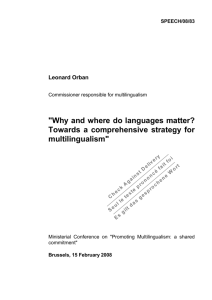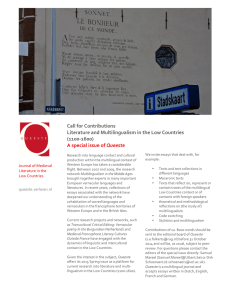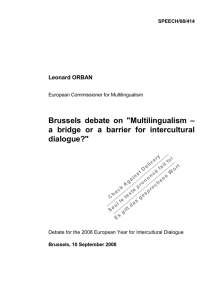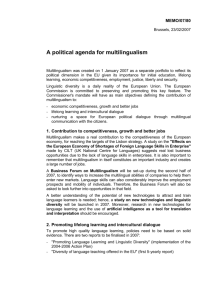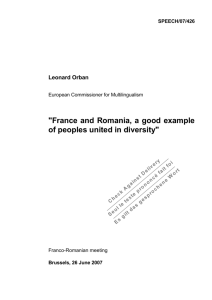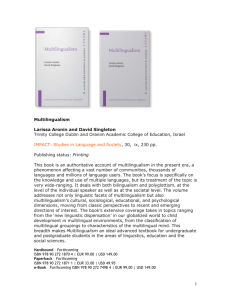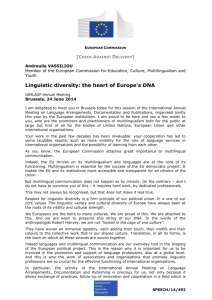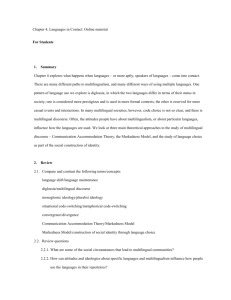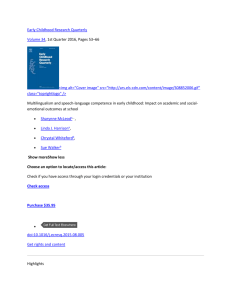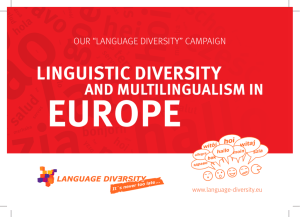The benefits and challenges of linguistic diversity in Europe
advertisement
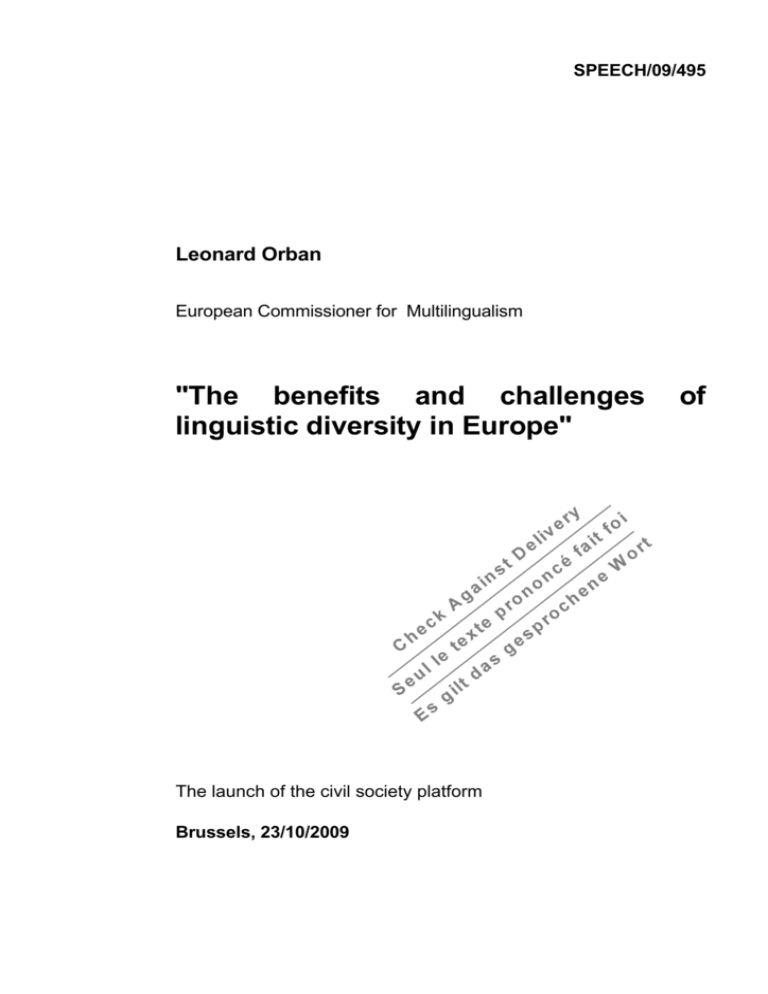
SPEECH/09/495 Leonard Orban European Commissioner for Multilingualism "The benefits and challenges linguistic diversity in Europe" The launch of the civil society platform Brussels, 23/10/2009 of Ladies and gentlemen, I am delighted to welcome you to this first meeting of the Civil Society Platform to promote Multilingualism. This platform is a much-needed opportunity for stakeholders to breathe new life into the debate on languages and intercultural dialogue, and to discuss new avenues to motivate younger and older people to learn languages. I am very pleased to see that so many organisations are willing to apply multilingualism policy in the fields of education and culture and in the media. I would like to talk today about the benefits and challenges of linguistic diversity in Europe, and the Commission’s policy to promote multilingualism. About the important links between multilingualism, intercultural dialogue and cooperation among communities. And to underline how language skills help us cope with the changing times that we live in. I would like to invite you to promote multilingualism through this platform thanks to your talents, ideas, and experiences. Language is the most direct expression of culture; it is what makes us human and gives each of us a sense of identity. The existence side by side of many different languages has been a constant feature of our European continent. We have always been aware of this multilingual reality in Europe. But perhaps not aware enough of the strength it can give our society. For languages are crucial bridges between cultures. To learn a new language is to explore new ways of thinking, new value-systems, to open our horizons to the richness of other cultures and ideas. As the European Commissioner for Multilingualism, I am committed to preserving and promoting our rich European linguistic and cultural diversity. We should use this diversity to Europe's advantage. A culture of multilingualism promotes a culture of openness and tolerance. These are crucial values not only for Europe but for the entire world. Any realistic international vision for the future of our world has to be founded on acceptance and appreciation of different cultures - and languages are at the heart of any culture. In the Commission's strategy on multilingualism I emphasise that multilingualism can play a key role in intercultural dialogue; in creating more cohesive and more sustainable societies. Increased migration and mobility have transformed many European societies. We want to help create intercultural societies where different communities and individuals engage in dialogue with one another. One priority is for migrants to learn the language of the host-country. This gives them access to jobs and to the life of the community; it is a means to becoming active citizens, engaged with society. But we also believe that having everybody learn more languages will bring about a more open society. Migrants should also have the chance to learn and cultivate their own native language, and feel proud of their cultures, identities and traditions. Each of the many national, regional, minority and migrant languages spoken in Europe adds a facet to our common cultural background. But they also offer us many other rewards: in social cohesion, prosperity, employability - and better relations with our partners across the world. We want to make our European motto "Unity in Diversity" the daily reality of our continent. 2 Multilingualism has a strong educational dimension. Universities and schools are essential. But language teaching must not be confined to academic institutions. Not only young people, but adults too, should be encouraged to carry on learning foreign languages, with facilities on hand to make this possible. Workers should have the opportunity to improve the language skills relevant to their working life. Language learning is for all citizens, throughout their lives. This is probably the most important message of our strategy on multilingualism: language learning is for all at all times in their lives.. Our strategy also highlights the links between prosperity, employability and multilingualism. We live in an age of globalisation. We have reaped its benefits and, more recently, its disadvantages, too. Europe is being hit hard by the effects of the global economic crisis. The crisis has brought home to us just how much our world is interconnected and interdependent. And it has shown us how quickly the world can change. In our global world, it is crucial to understand each others' languages and cultures to strengthen the bridges between different continents. The media and new technologies can be of great help. The media in particular have the potential to open channels for intercultural dialogue, by depicting and reflecting our more complex societies, offering space for more voices to be heard. They can also be a great source of informal language learning through 'edutainment' and subtitled films. And, last but not least, they are one of the most precious resources for economic growth. The establishment of a structured dialogue with both civil society and businesses is another milestone in the Commission's strategy to promote multilingualism. One month ago, I launched the Business Platform, as a forum for the exchange of best practices for companies, social partners and trade organisations. Today, I am inviting you to be active, innovative and creative in this new forum involving many prestigious organisations in the areas of culture, media and nonformal and informal education. It is not up to me or the Commission to dictate your agenda. We would very much like you to elaborate your own themes based on the strategy we have outlined in our Communication on multilingualism. The intention is that you act independently; you make your own proposals on how we can move from words to action. As interest organisations with large networks, you have considerable power, provided that you can pool your resources and make your voice heard. I sincerely hope that as a group you will find common ground for fruitful discussions and tangible outputs. The Commission takes on the role of facilitator, or amplifier if you wish. Your concrete contributions will feed into the policy process that we call the Open Method of Coordination and also involves the governments of the Member States. At the same time, we would like to see discussions take off within your own respective networks. We expect you to encourage your members to get involved at national, regional and local level, to collect good practice on multilingualism and make it known through this platform. 3 If you can start the ball rolling, this platform will have a real impact on the public debate. Languages will become a crucial key skill for the future, not only on paper. That was my vision when I took up this job. We have already come a long way; with your commitment and support we will surely be able to prove that languages open doors. Thank you! 4
